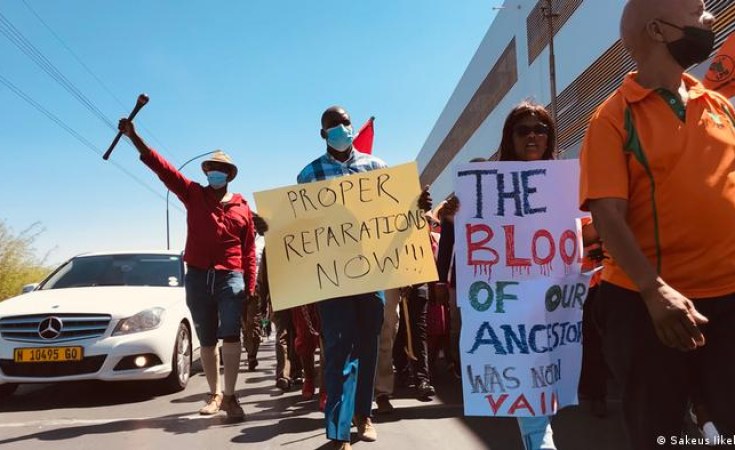The Nama and Herero have asked Namibia's highest court to stop a planned genocide 'reconciliation' deal between Namibia and Germany. A decision is pending but Germany appears set on implementing the deal.
At the end of January, an explosive lawsuit came before Namibia's highest court: the judges were asked to stop a planned genocide 'reconciliation' agreement with Germany.
The case was brought by opposition leader Bernadus Swartbooi and prominent representatives of the Herero and Nama peoples -- victims of the genocide during German colonial-era rule.
A court decision is still pending. But if the plaintiffs had hoped to put pressure on the German government with the lawsuit alone, their plan may not work.
Government talks are ongoing
"The federal government and the Namibian government stand by the joint declaration and are of the opinion that outstanding issues are to be clarified by way of renegotiations," a left-wing member of Germany's Bundestag, Sevim Dagdelen, said.
The left-wing politician made the remarks in an inquiry to parliament.
The German Foreign Office, in a letter to Dagdelen, did not explicitly mentioning the lawsuit. The reason given was that it does not comment on domestic legal proceedings. It said representatives of both governments had met four times in November and December to discuss open issues.
Dagdelen criticized the response. "The German government is cowardly stealing from its responsibility by referring to the Namibian government, which is the defendant, instead of at least making it clear out of respect for the judiciary that it will refrain from implementing the Joint Declaration until the court has reached a decision," the lawmaker told DW.
On other issues in dispute, the German government is putting up stop signs: The renegotiations are to continue, only at government level. There will be no giving in to the demand by the Herero and Nama for direct talks.
No "agreements" with Herero and Nama
Since independence in 1990, Namibia has had a democratic government that represents it's entire people, the letter to Dagdelen states. "In this respect, intergovernmental arrangements with individuals or with individual groups within Namibia are prohibited."
This stance infuriates Herero and Nama and many others in Namibia. "Relevant stakeholders were not consulted," says Lifalaza Simataa of Namibia's opposition Landless People's Movement party, one of the plaintiffs in the lawsuit.
"No elected representatives of the Namibian people participated in the drafting of the Joint Declaration and important representatives of the Herero and Nama people were excluded from the conclusion of the declaration," Simataa told DW.
The German and Namibian governments regularly point out that other representatives of the two ethnic groups took part in the negotiations. It is unclear, however, how many Herero and Nama they represent.
Tough stance on reparations
The German government also remains tough on the contentious issue of reparations. Germany is offering Namibia Ꞓ1.1 billion over 30 years. The money is expected to be used for development projects that benefit the Herero and Nama. Some Herero and Nama are however demanding official reparations.
"For lack of a legal basis, there are neither individual nor collective claims for reparations by individual descendants of victims or their associations against the German government," the Foreign Office wrote to Dagdelen.
The German government "is only interested in buying its way out of history with the Namibian government," says lawmaker Dagdelen.
Herero, Nama and their allies see it the same way. "We are talking about a crime here. And whoever commits a crime must pay a penalty," Nandiuasora Mazeingo, Chairman of the Ovaherero Genocide Foundation (OGF), told DW.
The so-called "reconciliation agreement", Mazeingo says, is an agreement on bilateral cooperation and development aid -- the kind that Germany has with many countries.
"This is different from reparations."
Jasko Rust (in Windhoek) contributed to this article
This article was originally written in German.
Adapted by Martina Schwikowski
Edited by Benita van Eyssen


